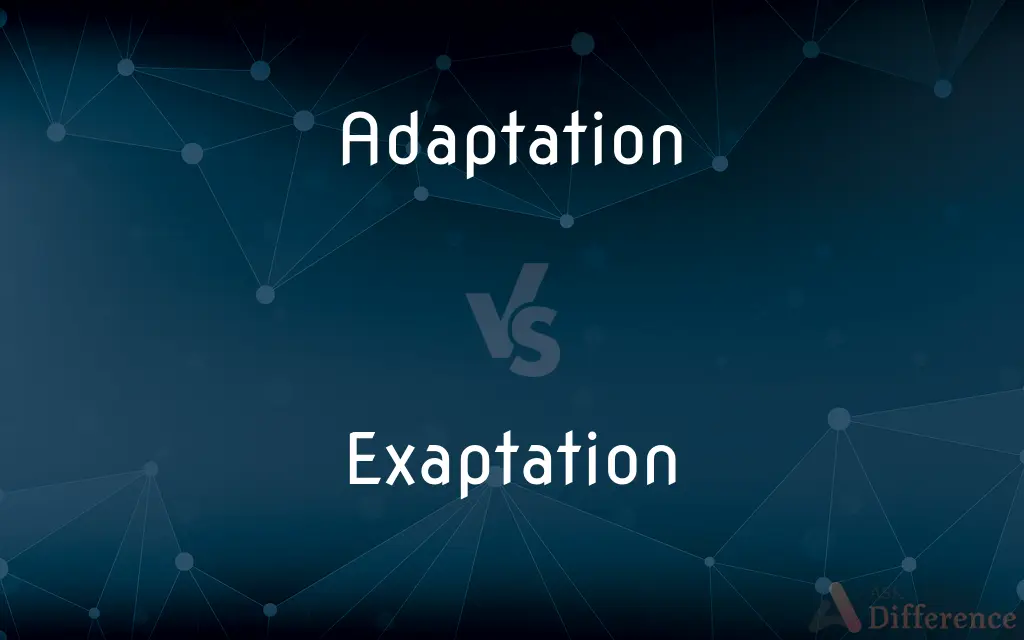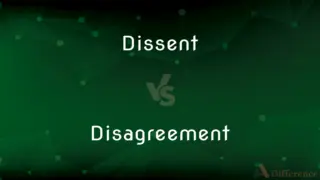Adaptation vs. Exaptation — What's the Difference?
By Maham Liaqat & Urooj Arif — Updated on March 14, 2024
Adaptation involves traits evolved for specific functions, whereas exaptation refers to traits gaining new functions not originally evolved for.

Difference Between Adaptation and Exaptation
Table of Contents
ADVERTISEMENT
Key Differences
Adaptation is the evolutionary process where an organism becomes better suited to its environment, developing traits that enhance survival and reproduction. On the other hand, exaptation describes how existing traits can acquire new functions, not necessarily related to their initial evolutionary purpose.
Traits that arise through adaptation are specifically shaped by natural selection to meet environmental challenges, enhancing an organism's fitness. Whereas exaptation involves traits that, while they may have been adaptive for one function, are co-opted for a new use, often serendipitously.
Adaptations can be seen in the development of camouflage in animals, making them less visible to predators or prey. Conversely, the feathers of birds, initially evolved for temperature regulation, are an example of exaptation, later being co-opted for flight.
While adaptation focuses on the current utility of a trait in enhancing an organism's fitness within its environment, exaptation emphasizes the reapplication or additional utility of a trait beyond its original evolutionary purpose.
Adaptive traits often emerge in response to specific environmental pressures, leading to a direct enhancement of an organism's reproductive success. In contrast, exapted traits may not confer an immediate adaptive advantage but can become beneficial under different circumstances or in novel roles.
ADVERTISEMENT
Comparison Chart
Definition
Evolution of traits specifically for a function or survival advantage.
Acquisition of new functions by pre-existing traits, not originally evolved for.
Focus
Survival and reproductive success in a specific environment.
New uses or functions of existing traits, beyond initial evolutionary reasons.
Evolutionary Process
Traits shaped directly by natural selection to meet specific challenges.
Traits co-opted for new uses, often unrelated to their original purpose.
Examples
Camouflage in animals, beaks in birds.
Bird feathers for flight, mammalian ear bones for hearing.
Outcome
Direct enhancement of fitness and survival.
Serendipitous benefits, expanding trait utility.
Compare with Definitions
Adaptation
The process by which organisms become better suited to their environment.
The polar bear's white fur is an adaptation for blending into snowy landscapes.
Exaptation
A process where a trait developed for one purpose is co-opted for a new use.
Bird feathers, originally for temperature regulation, became useful for flight.
Adaptation
A trait evolved through natural selection to solve a specific problem.
The cactus's thick skin is an adaptation to minimize water loss.
Exaptation
An evolutionary concept explaining how traits can gain new functions.
Dinosaur feathers used for display or warmth later enabled birds to fly.
Adaptation
Evolutionary changes that improve a species' survival chances.
The development of antibiotic resistance in bacteria is an adaptation to survive in hostile conditions.
Exaptation
A trait's acquisition of a novel function beyond its original evolutionary purpose.
The human appendix, once used for digesting cellulose, now plays a role in immune functions.
Adaptation
The adjustment of organisms to their environment through behavioral, physiological, or structural changes.
Migratory birds adapt to different climates by changing locations seasonally.
Exaptation
The serendipitous gain of beneficial functions by existing traits.
The use of mammalian ear bones, originally part of the jaw, for hearing.
Adaptation
A characteristic that enhances an organism's ability to survive and reproduce in its specific environment.
The mimic octopus's ability to imitate other species is an adaptation to avoid predators.
Exaptation
The utilization of an existing trait for a function not originally evolved for.
The swim bladder in fish, initially for buoyancy, later facilitated respiratory functions.
Adaptation
In biology, adaptation has three related meanings. Firstly, it is the dynamic evolutionary process that fits organisms to their environment, enhancing their evolutionary fitness.
Exaptation
Exaptation and the related term co-option describe a shift in the function of a trait during evolution. For example, a trait can evolve because it served one particular function, but subsequently it may come to serve another.
Adaptation
The act or process of adapting.
Exaptation
The utilization of a structure or feature for a function other than that for which it was developed through natural selection.
Adaptation
The state of being adapted.
Exaptation
The use of a biological structure or function for a purpose other than that for which it initially evolved.
Birds initially developed wings and feathers as a means of heat regulation. The use of wings for flight is an example of exaptation.
Adaptation
Something, such as a device or mechanism, that is changed or changes so as to become suitable to a new or special application or situation.
Exaptation
The promotion of meaningless or redundant material so that it does new grammatical (morphosyntactic or phonological) or semantic work.
Adaptation
A composition that has been recast into a new form
The play is an adaptation of a short novel.
Adaptation
Change or adjustment in structure or habits by which a species becomes better able to function in its environment, occurring through the course of evolution by means of natural selection.
Adaptation
A structure or habit that results from this process.
Adaptation
(Physiology) The responsive adjustment of a sense organ, such as the eye, to varying conditions, such as light intensity.
Adaptation
Change in behavior of a person or group in response to new or modified surroundings.
Adaptation
(uncountable) The process of adapting something or becoming adapted to a situation; adjustment, modification.
Adaptation
(countable) A change that is made or undergone to suit a condition or environment.
Adaptation
The process of change that an organism undergoes to be better suited to its environment.
Adaptation
An instance of an organism undergoing change, or the structure or behavior that is changed.
Adaptation
(uncountable) The process of adapting an artistic work from a different medium.
Adaptation
An artistic work that has been adapted from a different medium.
Adaptation
(sociology) The means by which social groups adapt to different social and physical environments.
Adaptation
The act or process of adapting, or fitting; or the state of being adapted or fitted; fitness.
Adaptation
The result of adapting; an adapted form.
Adaptation
A written work (as a novel) that has been recast in a new form;
The play is an adaptation of a short novel
Adaptation
The process of adapting to something (such as environmental conditions)
Adaptation
(physiology) the responsive adjustment of a sense organ (as the eye) to varying conditions (as of light)
Common Curiosities
How do adaptation and exaptation differ?
Adaptation focuses on traits specifically evolved for survival advantages, whereas exaptation involves traits that gain new functions beyond their initial evolutionary reasons.
What is exaptation?
Exaptation is the acquisition of a new function by a trait that was not originally evolved for that purpose.
Can a trait be both an adaptation and an exaptation?
Yes, a trait can first arise as an adaptation and later become exapted for a different function.
Why is exaptation important in evolution?
Exaptation is important because it demonstrates the flexibility and innovation in evolution, showing how traits can be repurposed for new functions.
What is an example of an adaptation?
An example of an adaptation is the giraffe's long neck, which allows it to access leaves high up in trees.
Is mimicry an adaptation or exaptation?
Mimicry is typically considered an adaptation because it evolves as a direct response to predation pressures.
What is adaptation?
Adaptation refers to the evolutionary process where an organism develops traits that enhance its survival and reproductive success in its environment.
How does exaptation contribute to species diversity?
Exaptation can lead to increased species diversity by enabling organisms to exploit new niches or adapt to new environments through the innovative use of existing traits.
How do scientists identify exaptations?
Scientists identify exaptations by studying the evolutionary history of traits and their current functions, often involving comparative anatomy and genetics.
Does exaptation challenge traditional views of evolution?
Exaptation complements traditional views of evolution by highlighting the complexity and flexibility of evolutionary change, beyond simple adaptation.
How do adaptations arise?
Adaptations arise through the process of natural selection, where beneficial traits become more common in a population over generations.
What is an example of exaptation?
Feathers in birds are an example of exaptation; initially evolved for temperature regulation and later co-opted for flight.
How does exaptation affect our understanding of natural selection?
Exaptation expands our understanding of natural selection by showing how traits can evolve for one purpose but end up serving entirely different functions, illustrating the unpredictability and innovation of evolutionary processes.
Are all traits adaptations?
Not all traits are adaptations; some are the result of genetic drift or exaptations.
Can human inventions be considered forms of exaptation?
In a metaphorical sense, human inventions can be seen as forms of exaptation when existing technologies or ideas are repurposed for new applications.
Share Your Discovery

Previous Comparison
Dissent vs. Disagreement
Next Comparison
Inter vs. EnterAuthor Spotlight
Written by
Maham LiaqatCo-written by
Urooj ArifUrooj is a skilled content writer at Ask Difference, known for her exceptional ability to simplify complex topics into engaging and informative content. With a passion for research and a flair for clear, concise writing, she consistently delivers articles that resonate with our diverse audience.
















































